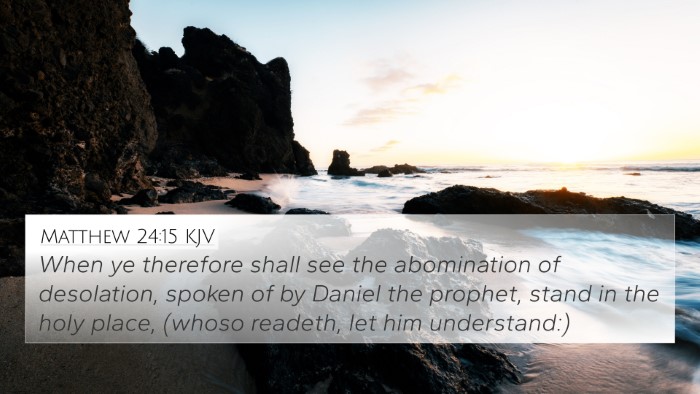Understanding Revelation 17:9
Verse: Revelation 17:9 - "This calls for a mind with wisdom: the seven heads are seven mountains on which the woman is seated."
Overview
Revelation 17:9 is a verse that invites readers to employ wisdom to understand symbolic language used in the Scriptures. The reference to "seven heads" and "seven mountains" is critical for interpreting the vision of the fall of Babylon, which represents corrupt and apostate religious systems.
Commentary Insights
- Matthew Henry: Henry explains that the people must possess wisdom to understand the mysteries detailed in the apocalyptic literature. The “seven heads” signify both geographical locations—the hills of Rome—and symbolize different Latin empires throughout history. He emphasizes the sexual immorality of the woman who sits upon these heads as a metaphor for spiritual corruption.
- Albert Barnes: Barnes elaborates on the significance of the seven mountains. He discusses how they represent major civilizations and their influence on religious practices. The mountains are also figurative of the power struggles inherent in these nations. His analysis reveals a connection between historical Rome and the apostasy that followers of Christ are warned against.
- Adam Clarke: Clarke provides a deeper exploration of the historical context behind the “woman” and the “beast.” He interprets the woman as personifying a prominent false religious system known as the “Mother of Harlots.” Clarke notes the varied opinions on the identity of the beast and highlights the importance of discerning true faith as opposed to insidious movement against it.
Related Bible Cross-References
This verse is deeply connected to several other passages within the Bible, enriching its interpretation:
- Revelation 13:1 - Discusses the beast that rises out of the sea.
- Revelation 17:5 - Describes Babylon the Great, the mother of harlots.
- Daniel 2:31-43 - Refers to the great image representing world empires.
- Isaiah 47:1 - Speaks to the fall of Babylon in a prophetic context.
- Jeremiah 51:7 - Indicates the metaphor of Babylon as a cup of iniquity.
- Matthew 24:15 - Mentions the abomination of desolation, linking themes of false worship.
- 1 Peter 5:13 - Alludes to Babylon in a letter to the Christians, emphasizing the early Church's struggle against falsehood.
Connecting the Themes
The themes presented in Revelation 17:9 resonate throughout both the Old and New Testaments, especially in addressing topics such as spiritual fidelity versus apostasy and the inevitable judgment of corrupt systems. The implications of the seven heads suggest a pattern of governmental and religious structures that challenge believers to maintain clarity and adherence to divine truth.
Tools for Bible Cross-Referencing
For anyone seeking deeper understanding, here are some tools and techniques for biblical cross-referencing:
- Bible Concordance: An essential tool that helps locate specific verses or themes within the Scriptures.
- Bible Cross-Reference Guide: A guide that highlights verses with similar themes or messages.
- Cross-Reference Bible Study: A methodical approach to studying the Bible by noting connections.
- Bible Chain References: A systematic way to connect different verses that relate to a particular theme.
- Comprehensive Bible Cross-Reference Materials: Such as thematic studies, which help in understanding word usage and context.
Conclusion
Revelation 17:9 serves as a powerful reminder of the importance of wisdom in interpreting scripture. It invites the faithful to reflect on the broader implications of religious and political systems. By employing tools for cross-referencing and understanding the interconnections, readers can gain profound insight into how biblical texts dialogue with one another, illuminating deeper truths and encouraging spiritual discernment.
Further Study
For those looking to explore the connections between various Bible verses, consider how the themes in Revelation 17:9 correspond with views in both the Old and New Testaments. Engaging with comparative studies can enrich comprehension and lead to a more robust faith.












